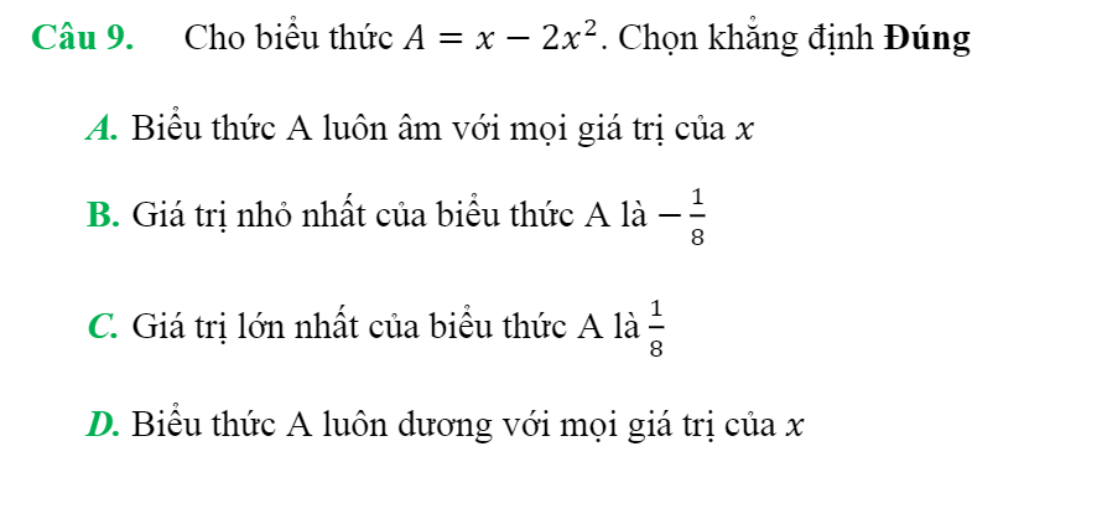
Hãy nhập câu hỏi của bạn vào đây, nếu là tài khoản VIP, bạn sẽ được ưu tiên trả lời.


a: =5(x^2-2xy+y^2-4z^2)
=5[(x-y)^2-4z^2]
=5(x-y-2z)(x-y+2z)
b: =(x-y)^2-z^2=(x-y-z)(x-y+z)
d: =(x-y)^2-4z^2
=(x-y-2z)(x-y+2z)
e: =3(x^2-2xy+y^2-4z^2)
=3(x-y-2z)(x-y+2z)
f: =(x-3y)^2-25z^2
=(x-3y-5z)(x-3y+5z)

Dùng hằng đẳng thức số 3 nhé bạn: \(a^2-b^2=\left(a-b\right)\left(a+b\right)\)
\(4x^3-36x=4x\left(x^2-9\right)=4x\left(x^2-3^2\right)=4x\left(x-3\right)\left(x+3\right)\)
Tức là không thể biến cái (x2 - 32) thành (x - 3)2 đúng không ạ?

a, \(\frac{x+1}{2x+6}+\frac{2x+3}{x^2+3x}=\frac{x+1}{2\left(x+3\right)}+\frac{3x+2}{x\left(x+3\right)}\)
\(=\frac{x^2+x}{2x\left(x+3\right)}+\frac{6x+4}{2x\left(x+3\right)}=\frac{x^2+7x+4}{2x\left(x+3\right)}\)
b, Sua de : \(\frac{3}{2x+6}-\frac{x-6}{2x^2+6x}=\frac{3}{2\left(x+3\right)}-\frac{x-6}{2x\left(x+3\right)}\)
\(=\frac{3x}{2x\left(x+3\right)}-\frac{x-6}{2x\left(x+3\right)}=\frac{2x+6}{2x\left(x+3\right)}=\frac{1}{x}\)

\(A=\dfrac{1}{1-x}-\dfrac{2x}{x^3+x-x^2-1}\)
\(\Leftrightarrow A=\dfrac{1}{1-x}-\dfrac{2x}{\left(x^3-x^2\right)+\left(x-1\right)}\)
\(\Leftrightarrow A=\dfrac{1}{1-x}-\dfrac{2x}{x^2\left(x-1\right)+\left(x-1\right)}\)
\(\Leftrightarrow A=\dfrac{1}{1-x}-\dfrac{2x}{\left(x-1\right)\left(x^2+1\right)}\)
\(\Leftrightarrow A=\dfrac{1}{1-x}+\dfrac{2x}{\left(1-x\right)\left(x^2+1\right)}\)
\(\Leftrightarrow A=\dfrac{x^2+1}{\left(1-x\right)\left(x^2+1\right)}+\dfrac{2x}{\left(1-x\right)\left(x^2+1\right)}\)
\(\Leftrightarrow A=\dfrac{x^2+1+2x}{\left(1-x\right)\left(x^2+1\right)}\)
\(\Leftrightarrow A=\dfrac{\left(x+1\right)^2}{\left(1-x\right)\left(x^2+1\right)}\) ( cho hỏi kiểm tra đề có sai ko vậy, để mình làm tiếp )

Hình trên có tổng cộng 40 mặt hình vuông nên có diện tích toàn phần là:
\(40.2^2=160\left(\operatorname{cm}^2\right)\)

\(9x^2-3x+2=9\left(x^2-\dfrac{1}{3}x+\dfrac{2}{9}\right)\)
\(=9\left[x^2-2.x.\dfrac{1}{6}+\left(\dfrac{1}{6}\right)^2-\dfrac{1}{36}+\dfrac{2}{9}\right]\)
\(=9\left[\left(x-\dfrac{1}{6}\right)^2+\dfrac{7}{36}\right]\)
\(=9\left(x-\dfrac{1}{6}\right)^2+\dfrac{7}{4}\)
Do \(9\left(x-\dfrac{1}{6}\right)^2\ge0\) với \(\forall x\)
\(\Rightarrow9\left(x-\dfrac{1}{6}\right)^2+\dfrac{7}{4}\ge\dfrac{7}{4}>0\) hay \(9x^2-3x+2>0\) với mọi x
=> Điều phải chứng minh

\(\left(x^2-1\right)\left(2x+3\right)=\left(x^2-1\right)\left(3x+2\right)\)
\(\Leftrightarrow\left(x^2-1\right)\left(2x+3\right)-\left(x^2-1\right)\left(3x+2\right)=0\)
\(\Leftrightarrow\left(x^2-1\right)\left(2x+3-3x-2\right)=0\)
\(\Leftrightarrow\left(x^2-1\right)\left(-x+1\right)=0\)
\(\Leftrightarrow\orbr{\begin{cases}x=1\\x=-1\end{cases}}\)
Vậy....
=> ( x2 -1 )( 2x +3) - ( x2 - 1)( 3x +2 ) =0
=> (x2 - 1). ( 2x +3 - 3x - 2) =0
=> ( x2- 1)( 1-x) = 0
=> x2 - 1 =0 hoặc 1 - x =0
=> x= 1

\(A=-2\left(x^2-\dfrac{1}{2}x\right)=-2\left(x^2-2.x.\dfrac{1}{4}+\dfrac{1}{16}-\dfrac{1}{16}\right)\)
\(=-2\left(x^2-2x.\dfrac{1}{4}+\dfrac{1}{16}\right)+\dfrac{1}{8}=-2\left(x-\dfrac{1}{4}\right)^2+\dfrac{1}{8}\le\dfrac{1}{8}\)
\(\Rightarrow A_{max}=\dfrac{1}{8}\)


